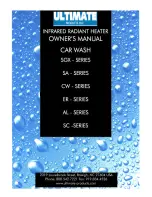
Installation
6
11. Clean sealing surface and groove of cover
flange; place on tank (see Figure 5).
NOTICE: Be sure discharge port lines up with
hole in base.
12. NOTICE: Tighten nuts as follows:
A. Hand tighten all nuts.
B. Tighten one nut snug.
C. Tighten opposite nut snug.
D. Proceed, tightening opposite pairs of nuts to
a snug fit.
E. Recheck all nuts, using same pattern. Be sure
all nuts are tight and that you have a good
seal.
NOTICE: Do not overtighten; you may
twist studs off of tank. If you have a torque
wrench, tighten to 85 inch-pounds (9.5 Nm)
torque.
13. Stand tank on feet and reconnect piping.
14. Recharge tank to proper air pressure (see Page 4).
15. Prime pump (see pump owner’s manual).
AIR VALVE REPLACEmENT
Hazardous Pressure. To be sure air
valve and core cannot blow out of tank, release all
air pressure from tank before removing valve core
or valve.
1. Disconnect power to pump.
2. Drain ALL water in system by opening faucet
closest to tank.
3. Depress valve core to release ALL air pressure
in tank. When air stops coming out of valve,
remove core from inside of valve to release
remaining pressure.
4. Push air valve back into tank. Be sure to remove
it before reassembling tank.
5. Disconnect piping from tank and turn it on its side.
6. Remove flange from tank.
7. Push water cell into tank far enough so that you
can get into tank with a dowel rod.
8. Soap the outside of the new valve and mount it
on the end of a piece of 1/4" or 5/16" (5-8 mm)
dowel rod. Push the valve up past the water cell
into its mounting hole in the top of the tank.
Push it through as far as it will conveniently go;
leave the valve cap on to protect the threads on
the valve.
9. Rap the end of the dowel sharply with a ham-
mer to drive the valve into position. Be sure
the shoulder on the valve seats against the tank
head (the ridge around the valve body should
be all the way through the hole in the tank head
– see Figure 6).
10. Remove the dowel. Make sure the old valve
has been removed from the tank, pull water cell
back over rim of hole in lower tank head, rein-
stall flange, stand tank upright and reconnect
piping.
11. Recharge tank (see Page 4), turn on power, fill
system, and tank is ready for service.
Figure 6 – Tap valve into place
2869 0697
To service
Pressure
Relief Valve
Pressure
Gauge
Pressure
Switch
From Well
160 0893
To Service
Pressure
Relief Valve
Tank with Submersible Pump
Tank with multi-Stage Pump
PIPING CONNECTIONS
SUBmERSIBLE AND mULTI-STAGE INSTALLATIONS
NOTE: When using metal pipe with plastic fittings use only
PTFE pipe thread sealant tape on male threads.







































